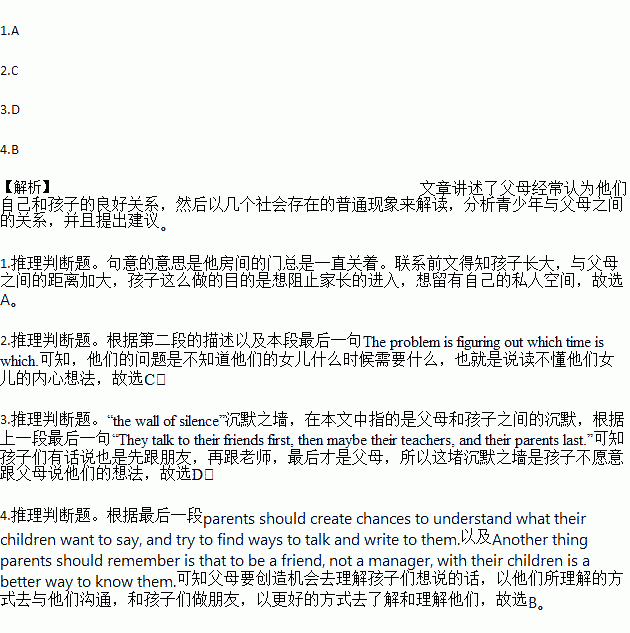题目内容
Parents often believe that they have a good relationship with the ir teenagers. But last summer, Joanna and Henry noticed a change in their older son: suddenly he seemed to be talking far more to his friends than to his parents. “The door to his room is always shut,” Joanns noted.
ir teenagers. But last summer, Joanna and Henry noticed a change in their older son: suddenly he seemed to be talking far more to his friends than to his parents. “The door to his room is always shut,” Joanns noted.
Tina and Mark noticed similar changes in their 14-year-old daughter. “She used to cuddle up (蜷伏)with me on the sofa and talk,” said Mark. “Now we joke that she does this only when she wants something. Sometimes she wants to be treated like a little girl and sometimes like a young lady. The problem is figuring out which time is which. ”
Before age 11, children like to tell their parents what’s on their minds. “In fact, parents are first on the list.” said Michael Riera, author of Uncommon Sense for Parents with Teenagers. “This completely changes during the teen years.” Riera explained. “They talk to their friends first, then maybe their teachers, and their parents last.”
Parents who know what’s going on in their teenagers’ lives are in the best position to help them. To break down the wall of silence, parents should create chances to understand what their children want to say, and try to find w ays to talk and write to them. And they must give their children a mental break, for children also need freedom, though young. Another thing parents should remember is that to be a friend, not a manager, with their children is a better way to know them.
ays to talk and write to them. And they must give their children a mental break, for children also need freedom, though young. Another thing parents should remember is that to be a friend, not a manager, with their children is a better way to know them.
1.“The door to his room is always shut” suggests that the son _______.
A. keeps himself away from his parents
B. doesn’t want to be disturbed
C. is always busy with his studies
D. begins to dislike his parents
2.What troubles Tina and Mark most is that ________.
A. their daughter isn’t as lovely as before
B. they don’t know what to say to their daughter
C. they can’t read their daughter’s mind exactly
D. their daughter talks with them only when she needs help
3.Which of the following best explains “the wall of silence” in the last paragraph?
A. Teenagers talk a lot with their friends.
B. Teenagers do not want to understand their parents.
C. Teenagers talk little about their own lives.
D. Teenagers do not talk much with their parents.
4.What can be learned from the passage?
A. Parents are unhappy with their growing children.
B. Parents should try to understand their teenagers.
C. Parents should be patient with their silent teenagers.
D. Parents have suitable ways to talk with their teenagers.
 天天向上一本好卷系列答案
天天向上一本好卷系列答案 小学生10分钟应用题系列答案
小学生10分钟应用题系列答案

 you add the salt?
you add the salt?